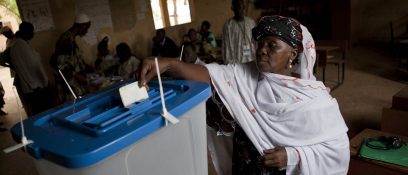Read part 1 here
I would have loved to watch and listen to educational conversations around the Referendum options, but all the discussions have been smeared with political sentiments. Hence, I will just tell you why I what I think of each proposed amendment to the Constitution of the country we all claim to love:
Why I am voting “no” for the Dual Citizenship Proposition
I think the proposed amendment to Article 28 of the Constitution does us more harm than good. I agree that dual citizenship ought to be a right for every Liberian. I acknowledge that Liberia has one for the most racist citizenship laws in the world, cognizant of the fact that Article 27 of the Constitution bans people of non-negro descent from becoming citizens of Liberia. However, amending Article 28 (a totally different Article) does not fix any of that! By voting “yes” to it, you will only be providing an option to people who are already citizens of Liberia to become citizens of other countries, without giving the people of non-negro descent who want to become Liberian citizens a chance. Also, this Proposition does not even update our citizenship laws to account for children of Liberian parents who were born in other countries when this demographic (Liberians born in the diaspora) has been purported to be the biggest “concern” in the citizenship discussion. I am still confused as to why, in the proposed amendment, certain offices are restricted from people with dual citizenship and not others when there are other positions that arguably have equal or more relevance. No explanation has been offered by anyone about this. Why is it acceptable for a citizen with dual nationalities to be a Representative or Senator, but he or she cannot be a Speaker? What would happen when all the Representatives are dual citizens? Would we have a different election for a citizen of single nationality to be Speaker? How does it make sense that someone with dual citizenship can be Minister of State, Minister of Public Works or Minister of Finance but not Minister of Justice. Why?
Why I am voting “no” for the Reduction of Terms & Frequency of Speaker and Senate Pro Tempore Elections
The proposed amendments to Articles 46, 48 and 50 seek to reduce the terms of Senators, Representatives and the President, respectively. It is true that the current terms for our Government officials are some of the longest terms in government practices around the world. I think it is a good idea to reduce the terms of our officials, but the timing is off. Changing the terms now results in a serious flaw in the timeline for election in our country especially when our government has not been able to adequately cover the cost of any of our election activities since 2003. Since the amendment can only come into effect after the 2020 senatorial elections, the Senators elected this year will have a mandate for 9 years and be up for re-election in 2029. The next senatorial elections, for the second ‘cohort’ will take place in 2023, and these senators would be elected for seven years if the amendment passes – i.e. they will go for re-election in 2030, just one year after the first cohort. This one-year separation between the two cohorts would then continue indefinitely. Changing the term now would increase the frequency of elections and cause us to have a national election almost every other year. All this could have been avoided if the Legislature had allowed expert testimony when they were having hearings on the issue.
The proposed amendment to Articles 47, 48 and 49 are meant to match changes to Articles 46, 48, and 50 so I think they should all wait at this time. Reducing these terms are all great ideas, but changing now causes more harm than good, in my opinion.
Why I am Voting Against Changing the Election Date by 1 Month
Regarding the proposed amendment to Article Article 83a of the Constitution, I agree with the argument made by Senator Nyonblee Karngar Lawrence (Grand Bassa) against the change in the Election Date. She pointed out that changing the election date from Second Tuesday in October to the Second Tuesday of November (one-month change) has no significant effect on the problems faced during campaign and elections. I agree that moving the election date out of the rainy season, as was done in Sierra Leone, could help in reducing the cost of distribution of election materials, thereby helping political parties campaign and generally increase citizens participation in election processes. However, October is not a historically significant date for Liberia since our elections were held in May of each year until 1976. So why not move it back to May? Why did the Legislature decide November was a better option when complaint cases rising out of the election procedures (as was seen in 2017’s election) could cause conflict with other processes such as inauguration?
Why I am Voting “No” on Changing the Timeframe of Electoral Complaints
The proposed amendment to Article 83c of the Constitution seeks to reduce the timeframe for the resolution of electoral complaints from 58 days to 43 days. I think this would be great, but even with this reduction, if there was complaint and appeal on the first round of a Presidential election, given the new timeframe of the second Tuesday in November, the second round would be delayed until the end of December. Thus, the inauguration date would not be met. This issue would be exacerbated if there were complaints on the second round.
Therefore, I believe that voting “no” to all these proposed amendments now would require the Legislature to take time and go back to the drawing board. We (Liberians) deserve more than mediocre options to vote on. If I vote “yes” to any option now, I will be enabling the standard of haphazardness and the lack of professionalism I went to school to graduate from.
Authored by: Joshua S. Kulah
Featured Image by: ISPI
**Information used in writing this Opinion Editorial were generated from the Supreme Court’s ruling on the Petition For A Writ of Prohibition between Collaborating Political Parties (CPP) and Rainbow Alliance versus The National Elections Commission and the Executive Branch of Government of the Republic of Liberia; The Liberia Elections Observation Network (LEON) Legislative Monitoring Report: August to December 2019; and The Daily Observer’syahoo.com online publications on December 3 & 6 2020.


We’ll penned my brother Joshua S Kulah I love the article.
You have awakened my subconscious mind which I considered the mind of wisdom that observes and thinks critically about issues.
Like I said in a comment to Referendum 101, our lisgelature is doing disservice to the people of Liberia who gave them power. The points you’ve pointed out have enlightened me; you pointed out that the propositions have more negatives than positives because the lisgelature have not critically formulated ideas to help the situations they’re trying to find remedy to.
I also agreed that sufficient education was not given to the public; I’m afraid that the public will still not have understanding on those issues unless the Legislature change their “illmanner” of governance and start to involve the people they represent in decision making.
I also realized that the first Proposition (article 28) which denied dual Citizens Liberians the right to some jobs, when passes will contradict article 18 which provides equal rights to work and employment to every Liberian citizens. I’m not also seeing any “life” in their assertion of pointing out some jobs that dual Citizen holders shall not hold.
Again, like you pointed out under the same article (28) that what will happen in the course of time, that all representatives are dual citizen holders, which is highly possible? There is much confusion regarding the prepositions. I also agreed with you that the legislature needs to get back on drawing board and think critically about these issues as regards the wellbeing of our country.